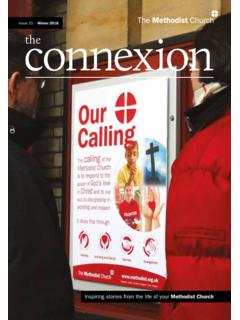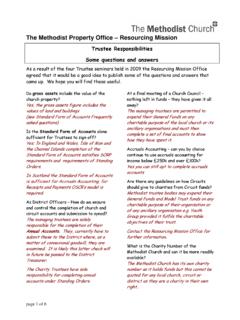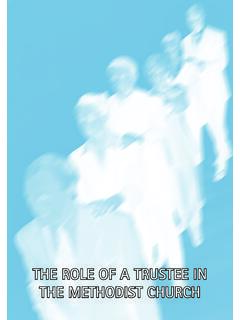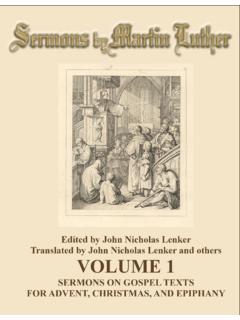Transcription of WESLEY ON SOCIAL HOLINESS - Methodist
1 WESLEY ON SOCIAL HOLINESS The Wesleyan movement was a commitment to a HOLINESS project. For john WESLEY HOLINESS of life was, the aim of his life, the organising centre of his thought, the spring of all action, his one abiding project .i The purpose of the Methodist movement was to spread scriptural HOLINESS throughout the land . WESLEY once claimed that there was no HOLINESS but SOCIAL HOLINESS . The original context of the saying was in relation to the necessity for Christian fellowship. WESLEY was countering a privatised notion of Christian faith.
2 One cannot go to heaven alone but one needs friends. It is within Christian community that HOLINESS of life is to be realized. Today SOCIAL HOLINESS needs to be extended beyond ecclesial koinonia. It is within the socio-economic and political community that HOLINESS of life is to be realized. During the late 19th century Wesleyan celebrations the English congregationalist preacher and theologian, R. W. Dale, reflecting on the Wesleyan heritage, claimed that Methodists had left the doctrine of HOLINESS with WESLEY and had not developed its potential as a great SOCIAL ethic.
3 The modern tendency towards individualism has too often resulted in Methodists understanding piety from an individualist perspective and reading the Wesleyan emphasis on sanctification or HOLINESS as an individual experience. The evangelistic practice flowing from this has emphasised the conversion of people one by one which then leads to changing society or the world. But does this gospel produce any real transformation at all apart from nominal change or conversion from a few personal bad habits?
4 The conversion or even sanctification of the individual leading to societal change may well be a subverting of the gospel leaving untouched personal and structural realities of power relations, domination, greed and violence. Towards the end of his life WESLEY was increasingly involved in a polemical relationship with the people called Methodists. At the end he even judged his scriptural HOLINESS project a failure. I am distressed. I know not what to do. I see what I might have done once. I might have said peremptorily and expressly, here I am: I and my bible.
5 I will not, I dare not, vary from this book, either in great things or small. I have no power to dispense with one jot or tittle of what is contained therein. I am determined to be a Bible Christian, not almost, but altogether. Who will meet me on this ground? Join me on this or not at all .. But, alas! The time is now passed; and what I can do now, I cannot tell. (Causes of the Inefficacy of Christianity, Works VII: 287-88). WESLEY frequently described HOLINESS as renewal of the whole image of God.
6 WESLEY did not understand this in a purely individualistic way. He used eschatology and creation theology in his reflection on HOLINESS . His horizon of HOLINESS was the whole world, created and recreated .ii If HOLINESS of life was described in terms of perfect love, then HOLINESS involved SOCIAL relations including environmental relations. For WESLEY the spreading of scriptural HOLINESS entailed the transformation of the economic and political order, the establishment of Pentecostal commun(al)ism and the abolition of war.
7 Iii HOLINESS was nothing less than a new creation. If WESLEY concluded at the end of his life that the Methodist HOLINESS project had failed, it was in no small measure due, in his judgment, to the material prosperity of the Methodist people. His great lament was that as Methodists increased in riches so there was a decline in HOLINESS . WESLEY s gain all you can and save all you can taken, as they often were in isolation from give all you can , subverted the HOLINESS project. WESLEY even wondered if.
8 True scriptural Christianity has a tendency, in process of time, to undermine and destroy itself? For wherever true Christianity spreads, it must cause diligence and frugality, which in the natural course of things, must beget riches! And riches naturally beget pride, love of the world, and every temper that is destructive of Christianity. (Causes of the inefficacy of Christianity, Works VII: 290). The failure of the Methodist HOLINESS project was ultimately the failure of the Methodists to stand in radical solidarity with the poor.
9 Yet WESLEY had repeatedly called on the Methodists to go to the poor and not simply to wait until the poor came to them. To one gentlewoman member of a society he wrote; Do not confine your conversation to gentle and elegant people. I should like this as well as you do. But I cannot discover a precedent for it in the life of our Lord, or any of his Apostles. My dear friend, let you and I walk as he walked .. I want you to converse more, abundantly more, with the poorest of the people, who, if they have not taste, have souls, which you may forward on their way to heaven.
10 And they have (many of them) faith, and the love of God in a larger measure than any persons I know. Creep in among these, in spire of dirt, and a hundred disgusting circumstances; and thus put off the gentlewoman. (Letter to A Member of the Society, February 7, 1776, Works 12: 301) WESLEY s own regular practice was to go to the poor and often these common wretches found a sense of self worth. WESLEY s opposition to the widespread use of liquor was not, as often thought, moralistic, but economic.

















